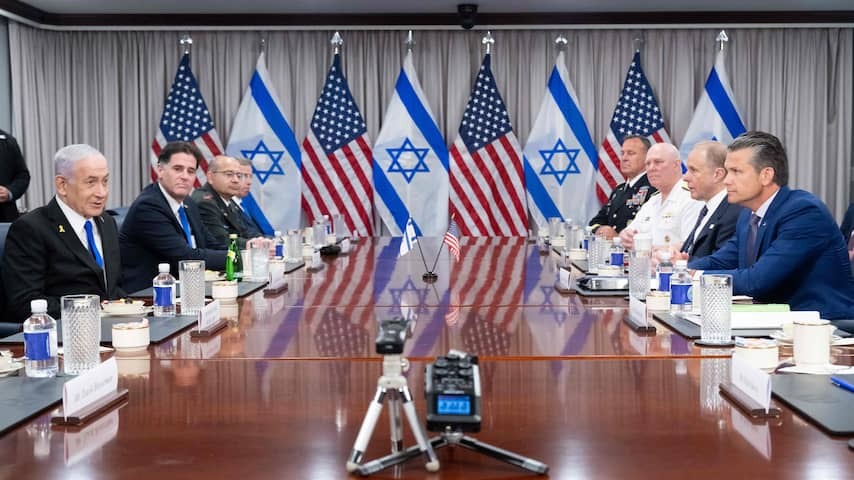
NU.nl regularly provides an overview of the developments in the war between Israel and Hamas. This time: A Gaza deal is still in the air, says Netanyahu. But even with a temporary ceasefire, peace is still far away.
On Thursday, Israeli Prime Minister Benjamin Netanyahu concluded a three-day visit to US President Donald Trump. This was the third time in less than half a year that Netanyahu visited the White House. The goal was a breakthrough in negotiations for a temporary ceasefire in Gaza.
All parties agree on the broad outlines. The ceasefire should last sixty days, Hamas releases half of the approximately fifty remaining hostages – of whom twenty are still alive – and Israel does the same with about a thousand Palestinian prisoners of war. As soon as the ceasefire takes effect, negotiations on a permanent ceasefire should also begin.
Prior to the summit, it was speculated that the final deal, which has been in the air for over a week, would be announced during Netanyahu’s visit to the United States. The Israeli Prime Minister spoke with Trump several times about the negotiations, but no agreement was reached.
Meanwhile, an Israeli delegation was in Doha to continue negotiating the deal under the leadership of mediators Qatar and Egypt. Although the Israeli Prime Minister said before his departure from the US that he hoped to announce such a deal in the coming days, there seem to be a number of obstacles.
Israel adheres to plan for mega-camp in Rafah despite internal criticism
Insiders tell The Financial Times that Hamas and Israel cannot agree on the withdrawal of the Israeli army from the Gaza Strip. Netanyahu wants to maintain control over the southern part of the area, while Hamas wants the armed forces to leave Gaza completely.
This is mainly due to a plan presented this week by Israeli Defense Minister Israel Katz. Katz wants to build a so-called “humanitarian city” on the remains of the bombed Rafah. Hundreds of thousands of Palestinians must be forcibly moved there.
Although that plan received unanimous approval from the Israeli parliament, there were critical voices within the top of the army and in Netanyahu’s own government. Forcibly displacing Palestinians could be a war crime, according to the Prime Minister’s legal advisors, writes The Economist.
Disagreement about the fate of Hamas after the war
And then there are the differing opinions about what should happen after a possible permanent ceasefire. Hamas is willing to hand over power to an independent technocratic government, but that is not enough for Israel.
Instead, Israel sticks to its goal of “completely destroying” Hamas, which means that the group must no longer be in Gaza when the war is over. Netanyahu wants to force as many concessions as possible now that Hamas and allies such as Hezbollah and Iran are seriously weakened, writes news site Vox in an analysis.
The point of contention over the fate of Hamas after peace is a recurring pain point in negotiations during the 21-month war. It underscores that even if both parties reach a deal in the short term and lay down their arms, permanent peace still seems very far away.
UN registers more than six hundred deaths at GHF points
The United Nations reported on Friday that it has registered more than six hundred deaths at food points of the Gaza Humanitarian Foundation (GHF). Last week it was just under five hundred deaths.
GHF was set up by the US and Israel and started distributing food at a number of points in the Gaza Strip six weeks ago. However, the aid locations are scarce and there is often too little food, which means that distribution moments regularly degenerate into chaos and violence.
The UN calls the aid locations “completely unsafe” and a violation of the standards of humanitarian work, which should be impartial. In addition to the 615 deaths at GHF locations, there were more than 100 fatalities at distribution points of other aid organizations, reports the UN.
The Israeli army reports in a statement that it has investigated the deadly incidents and says it has learned from them. “Instructions have been given to armed forces in the field following the lessons learned,” the army said.
EU comes up with plan to punish Israel for humanitarian situation in Gaza
The European Union is trying to exert more pressure on the Israeli government. A top Brussels diplomat told news agency Reuters on Friday that the EU has a plan to punish Israel if it does not improve the humanitarian situation in Gaza.
The plan would include ten possible sanctions that the EU could impose on Israel. One of these is, for example, suspending the association agreement between the two parties. This agreement includes trade agreements that give Israel access to the European internal market.
Brussels has long struggled with its policy towards Israel since the war in Gaza, but foreign policy chief Kaja Kallas now seems to want to pursue a tougher line towards Netanyahu’s government. Several member states have recently indicated that they favor a tougher policy.